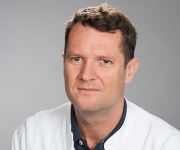Here you can find detailed profiles of DKTK faculty members with programm specification and research focus in the Researcher Database. Find contacts of all DKTK scientists at the DKTK intranet
Researcher Database

Prof. Dr. Thomas Kindler
Universitätsmedizin Mainz
Langenbeckstr. 1
55131 Mainz
Program
Exploitation of Oncogenic Mechanisms (EOM)
Summary
Malignant transformation is a multifaceted process characterized by the acquisition of somatic mutations and modulation of the epigenetic landscape. In concert, these alterations result in rewired signaling pathways and the activation of aberrant transcriptional programs followed by uncontrolled proliferation, impaired differentiation and invasive cell growth. A detailed understanding of cancerogenesis represents a prerequisite to identify drug targets, tumor-specific vulnerabilities and novel therapeutic approaches in personalized oncology.
Specific interests of our group include: i) oncogene-mediated dysregulation of DNA damage repair. In particular, we aim to explore the role of oncogenic KRAS on replicative stress, regulation of DNA repair pathway choice and synthetic dependencies, e.g. on PARP inhibition; ii) STAT5-dependent modulation of transcriptional networks and epigenetic programs in cancer cells with a strong focus on the analysis of distinct posttranslational modifications; and iii) patient-oriented research to understand and improve personalized treatment strategies in precision oncology. To address these questions, we take advantage of well-established experimental approaches, computational analyses and tumor models including genetically engineered mouse models or primary patient samples.
More information you will find at the UCT Mainz Website and at the Kindler Lab.